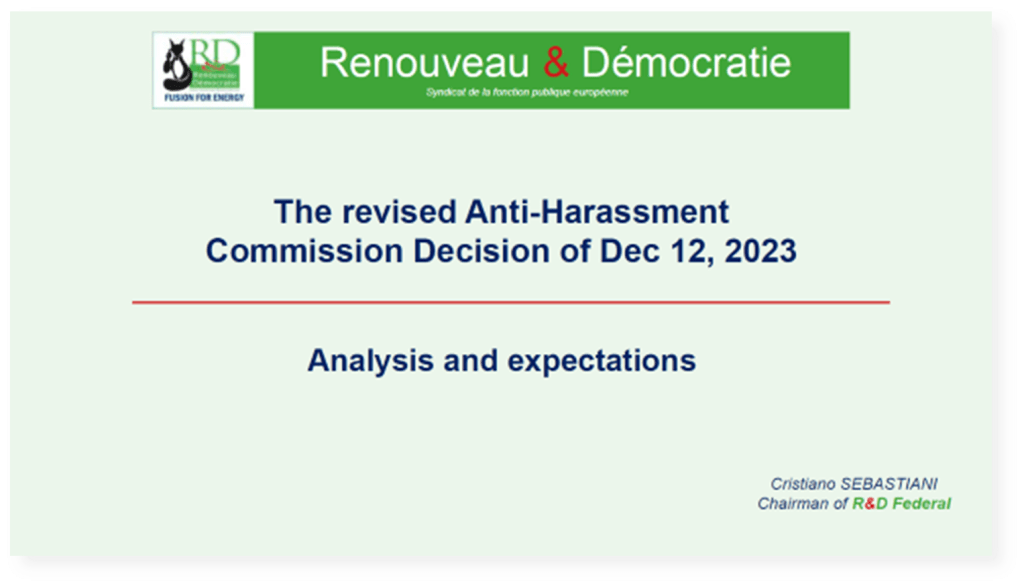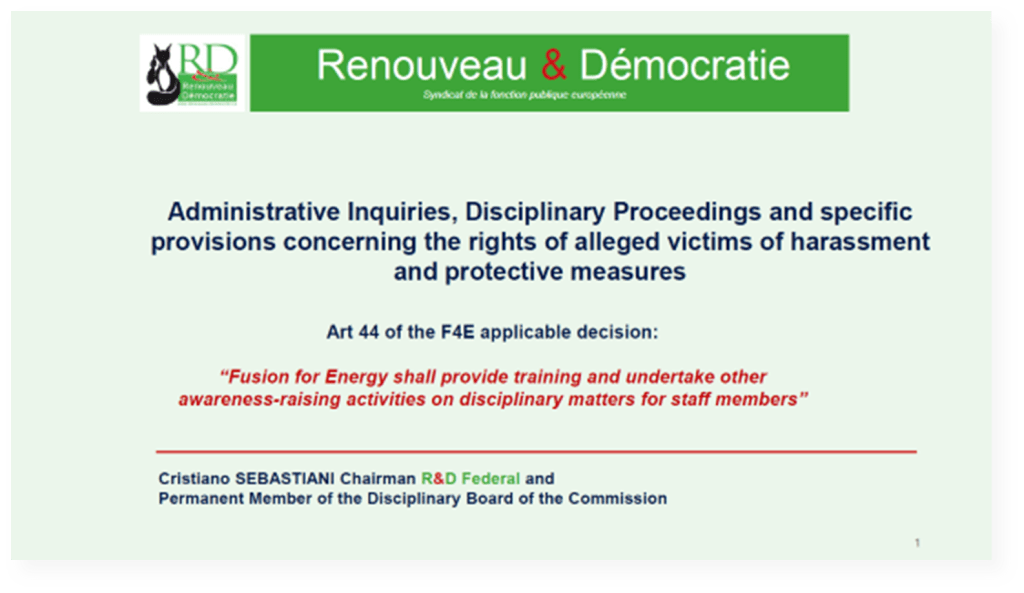FOLLOW UP OF OUR WEBINARS ON THE NEW COMMISSION ANTI HARASSMENT DECISIONAND DISCIPLINARY PROCEEDINGS.
FIRST OF ALL, A VERY VERY BIG THANK YOU FOR YOUR SO POSITIVE FEEDBACK CONCERNING THESE TWO WEBINARS AND FOR MY NOTE TO COMMISSIONER SERAFIN (Implementation of the new Commission Decision on harassment – The F4E case – Renouveau & Démocratie)
I was really overwhelmed by your so thankful words and encouragement to continue these efforts also with other webinars on aspects related to our Staff Regulations. My colleagues and I are already preparing presentations on the topics you have submitted to us.
As requested, please find bellow the two presentations that I used during the two webinars.
I would like to formally confirm again our absolute commitment to ensuring that the Commission’s decision is applied mutatis mutandis, providing as much as possible access to the Commission’ Confidential Counsellor, to Regulatory Agencies (Agencies) and Joint Undertakings (JUs).
Over and over again, since repetition is the mother of learning and repetita iuvant, we confirm that the more than serious concerns identified at F4E requires the Commission’s CCC to be in charge also for F4E staff.
That’s exactly why from the start of these discussions we had hoped that F4E’s Director, aware of the seriousness of the situation, would take the lead in demanding that the decision be applied also making a formal request to the Commission to allow F4E staff immediate access to the Commission’s CCC, independently of the demand of other agencies.
This is the only possible option to make a real contribution to restoring colleagues’ trust after the devastating findings of the F4E staff surveys and external psychosocial risk assessment survey carried out at F4E after the tragic loss of our beloved colleague.
Much more than the usual slogans and the even more usual self-congratulatory exercises, this would have been an undisputable sign of a change in culture at F4E, which could have really helped restore staff confidence. This was clearly not the case.
Indeed, most recently, we can only regret that the F4E Director in response to the formal request to that effect that I addressed to him at the last social dialogue meeting, has just stated that he will give us his answer at the next meeting.
Of course, it is never too late to take the right decisions, and so we remain hopeful that at the next meeting we will be able to thank him for finally making such a request to the Commission.
Nevertheless, it must be recognised that the F4E Director’s delay in making the right decision may also have been due to “legal clarifications” that just after our webinar were surprisingly, to say the least, communicated to F4E Unions on behalf of ‘F4E Management’.
In the light of this more than regrettable confusion which still seems to stubbornly persist, it is useful to remind, your very legitimate questions and our answers :
Concerning the information provided on behalf of “F4E management” concerning the F4E request of an “opt out” in order not to apply the anti-harassment new Commission’ decision and eventually keep on applying the internal F4E’s procedures already in place.
Your question :
“F4E Management” has confirmed to SC and Unions that, in the framework of Article 110 of the Staff Regulations (SR) F4E has already officially asked the Commission for an “opt-out”, the justification being that the decision mentions several Commission services that do not exist in the agencies as “CCC, IDOC, Mediation Service”. It would also seem that F4E could count on the support of the F4E GB and the Commission’s DG HR in this approach. And the possibility was openly mentioned that F4E could implement its own decision on the matter after the opt-out.
Does all this mean that F4E colleagues will be deprived of the progress made with the decision that we so appreciated during your webinar, above all of the support of a CCC?
And in such a case, what would be the final position of the Staff Representation and of the Commission, in this regard?
R&D’ answer :
First of all, it should be recalled that, under the procedure laid down in Article 110 of the Staff Regulations, the Commission has the final say whatever the demands of F4E and the other agencies are.
However, we do share your concerns and deeply regret the confusion that has arisen.
Secondly, we can only hope that the request for an “opt out” it is a simple “drafting error”.
One does not need to be a specialist in SR to understand the difference between perfectly legitimate requests for necessary technical adjustments – such as those concerning references to Commission services that do not exist elsewhere, i.e IDOC and the Mediation Service – and the totally inappropriate reference to the CCC, which did not exist before at the Commission and has just been introduced by the decision.
As is obvious without needing to be a specialist in SR, adaptations that do not alter the substance of the text of the decision, as the adaptation of the actors according to the internal organisation of the agencies, do not require the adoption of rules different from those adopted by the Commission and are therefore not subject to the derogation procedure.
In fact, the expression “by analogy” used by the statutory legislator means an application of the rules mutatis mutandis.
In this respect, it would be completely unacceptable to undermine the new decision by refusing to establish CCCs for the Agencies and JUs, despite this being an essential component of the new decision.
Over and over again, since repetition is the mother of learning and repetita iuvant, we confirm that the more than serious concerns identified at F4E requires the Commission’s CCC to be in charge also for F4E staff.
It should not be forgotten that the Commission’s CCC is already also in charge of the Executive Agencies as requested by their Directors, leading by example, in order to ensure their staff the same level of assistance and protection as their colleagues at the Commission. This was a decision that we called for and we are delighted that our proposal has been retained. And the staff of the executive agencies have now duly appreciated the decision of their Directors, thanking them for such a clear demonstration of duty of care.
Thirdly, we consider that the reference made on behalf of “the F4E management” to the possibility for F4E to adopt its own decision on the matter was simply just a regrettable, but only theoretical and didactic reminder of the possibilities potentially offered within the framework of the procedure of Article 110 of the SR.
On the one hand, “F4E Management” must have considered that, although R&D had first requested and then, together with the other Unions, negotiated the inclusion of Article 110 of the SR as part of the 2014 Reform, their representatives have still not grasped all the details of the procedure and it was therefore useful to offer them a dedicated and free training in the subject. This educational effort is naturally greatly appreciated by R&D.
On the other hand, it will be unacceptable and irresponsible to try to refuse to apply the Commission’s decision in order to adopt an “in house” F4E’s decision and eventually an “in house CCC”, keeping on claiming that everything is “already fine” with the in-house “management” of any potential case of harassment, of course being so proud of a legendary “zero tolerance”… the failure of which no longer needs to be proven.
In any case, we can already exclude that the representative of the Commission in the GB, DG HR and finally Commissioner Serafin having the last say, in the light on the Commission’s reinforced governance of the Agencies and JUs, were to accept any opt-out OR amendments that would render the decision completely useless, such as the disappearance of the role of the (CCC) or any other solution that could not fully guarantee his full independence.
It should not be forgotten that Commissioner Serafin’s mission letter stipulates that he is asked “to ensure that our revamped anti-harassment policy contributes to a safe and respectful workplace”.
It would be inconceivable to deprive the thousands of colleagues assigned to the regulatory agencies and the JUs of the same level of protection and assistance guaranteed to the staff of the Commission and the Executive Agencies. This is despite the fact that all the experts confirm that the nature of the non-permanent contracts and the lack of real mobility make these colleagues more vulnerable and therefore require stronger preventive and protective measures.
Concerning the fake news about the alleged “disappearance of the confidential counsellors (CCs)
Your question
“The information circulating at F4E that the adoption of the decision would result in the disappearance of the CCs, whereas during the webinar you mentioned quite the opposite, that their roles would have been strengthened by the decision thank to the coordination ensured by the CCC. Can you clarify this matter as well?”
R&D’s answer
This is absolutely fake news!
It would take more than a cursory reading of the new decision to really believe that it aims to abolish CCs!
On the contrary, as illustrated in the webinar, the role of the CCs will be considerably strengthened by being coordinated by the CCC without any interference from the administration (see art.12, 13, 14, 15, 28, 29 and 30 of the Commission Decision…).
Their role is so crucial and their missions so reinforced that the CCs are mentioned 69 times in the text of the decision!
Not to mention that, in implementation of the decision, the at the Commission the procedure for appointing the CCs has just been completed, under the full responsibility of the CCC.
Cristiano Sebastiani
Chairman of R&D Federal


